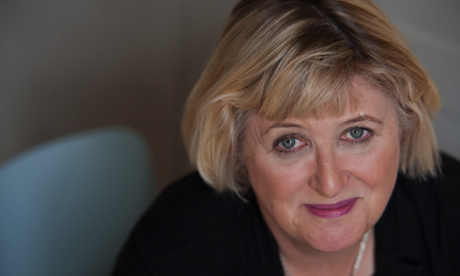Award winning children’s author Sally Gardner comes out fighting with attack on Michael Gove

Author Sally Gardner. Photograph: Eleonore de Bonneval
Since Maggot Moon won the CILIP Carnegie Medal, the oldest and most prestigious award for children’s fiction, Sally Gardner has been busy.
“It’s just been a whirlwind, it’s been utterly bizarre”, she says over the phone having spent the evening on Newsnight and the morning in Manchester on the BBC Breakfast Sofa.
“I’ve had to take my shoes off so I could feel the pavement to make sure I was still there. I felt as though I was floating away, it was so wonderful to have won it.”
We catch up a few days later near Stoke Newington Library, the recipient of £500 worth of books thanks to Sally’s Carnegie triumph. The torrent of public appearances remains unabated and Sally is still giddy from the charms of George Alagiah (“such a gentleman”) on BBC World Television that morning.
Such is the demand that when we are interrupted by an urgent phone call, I briefly panic that Sally may have to rush off to another engagement. Thankfully though, the call is an update about her beloved daschund, Lottie.
It is Lottie who keeps Sally company while she works at her flat off of Stoke Newington Church Street, where she has lived since 2005.
“I do all of my writing on a lovely old 1940s desk, which makes a fabulous banging noise, surrounded by books and my dog,” she says.
It was among these trappings that Maggot Moon was crafted. It’s set in a nightmarish totalitarian 1956, in which dissidents banished to Zone Seven (which Sally reveals is based on Muswell Hill) are terrorized by Stasi-esque spies, The Greenflies.
The protagonist Standish Treadwell is 15 and, like Sally, is deeply dyslexic. Standish has been desensitized to the daily, often-hideous brutality of the regime, but the perspective his dyslexia affords him means he remains a “breeze in the park of imagination”.
The concept for Maggot Moon grew out of Sally’s extensive research for a previous novel, The Double Shadow, during which she became fascinated with counterfactuals and ‘What If?’ histories.
She says: “With fairy stories, you have an ability to build a moat or psychological water around a subject and you don’t have to enter the kingdom, you can work the story from the shore. But pushing it back into the past allows you to decide how far involved you want to get.”
The sense of alienation that Standish endures was informed by Sally’s own time at school.
“I didn’t realize Standish was dyslexic when I started writing,” she says. “I didn’t set out to write a dyslexic hero, I just wanted to create someone who saw the world like I did.”
While growing up Sally was labeled “unteachable”. She was finally diagnosed as severely dyslexic aged 12 and didn’t learn to read until she was 14.
“If you don’t understand the words, and you’re bored out of your trolleybus you’re going to become very naughty indeed,” she says.
Sally graduated from Central St Martins and later worked in theatre as a costume and set designer for fifteen years, a period that helped shape her story-telling.
“In theatre you can see a story,” she says. “You can see what dies and what holds people’s attention.”
She used the public attention of her acceptance speech to strongly criticize the government’s “outdated curriculum”, and she is exasperated by standardized testing.
“Michael Gove is a big fan of being the biggest headmaster that ever bossed the world around,” she says. “We should be allowing free, inquiring minds and this prescriptive education is a huge mistake. The most important question a child can ask is ‘why?’ and you can’t risk extinguishing that inquisitiveness.”
After reaching the critical peak of children’s fiction, how does Sally hope to keep inflaming young imaginations?
“You’re as good as the book you’ve last written so hopefully I can keep going. I have to. There’s so much I still want to write.”
Maggot Moon is published by Hot Key Books and is available now for £10.99
